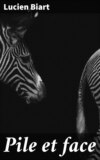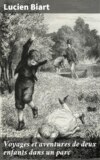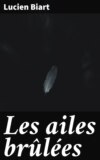Kitabı oku: «Adventures of a Young Naturalist», sayfa 16
CHAPTER XXIII
AGAIN ON THE ROAD. – THE BIRD-CATCHING SPIDER. – THE MARTEN AND THE SKUNK. – THE FLYING SQUIRREL. – THE OTTER-HUNT. – L'ENCUERADO WOUNDED
Three days of difficult travelling brought us into the midst of the Terre-Tempérée. Thus we had traversed the whole breadth of the Cordillera, at one time shivering on their summits, at another perspiring, as we penetrated narrow and deep-sunk valleys, just as the chances of our journey led us. Every now and then we caught a sight of the pointed cone of the volcano of Orizava, which assisted us in taking our bearings. At last, four days after taking leave of Coyotepec, we established our bivouac at the foot of a mountain, close to a clear and icy stream.
While l'Encuerado was making the fire, Lucien discovered under a stone an enormous black and hairy spider, with feet armed with double-hooked claws.
"Isn't this a tarantula, M. Sumichrast?"
"No, my boy, it is a bird-catching spider – so called because it is said to attack the humming-birds' nests and destroy the young ones."
"May I catch it?"
"Not with your fingers; its bite is dangerous."
"One might easily fancy it was watching us, from the expression of those two big eyes near its mouth."
"There is no doubt that it is looking at us; just menace it with this little stick, and you'll soon see it assume the defensive."
The enormous spider raised its front feet, and two black and polished horns issued from its mouth. After a moment's hesitation, it suddenly darted at the end of the stick, which Lucien let go in fright.
Ten or twelve paces farther on, the young naturalist discovered another spider, and plied me with numerous questions about it. I could only give him a few general facts as to this curious class of animals.
"But, I say, papa, there must be a great many different species of spiders, for I see some at every step – green, black, and yellow."
"There are so many species that all of them are not yet known; indeed, I believe that the Mexican spiders have not hitherto been described. It is necessary to study them on the spot, for their soft bodies change their shape in drying, and the proper means of preserving them are not within the reach of an ordinary traveller."
In passing along, I broke through some threads of a light web stretching between two bushes. The proprietor of the web – a gray spider – immediately made its appearance, and set hurriedly to work to repair the involuntary damage I had committed.
"Where does the thread come from?" asked Lucien; "it is so thin that I can scarcely see it."
"From four reservoirs situated at the lower part of the spider's abdomen, and filled with a gummy matter which becomes solid as soon as it is exposed to the air. These reservoirs are pierced with about a thousand holes, from each of which proceeds a thread invisible to the naked eye, for it takes a thousand of them to form the thread the spider is now spinning."
"How sorry I am now that I hadn't collected more of these curious insects! Some we have met with were very curious."
"In the first place," I replied, "spiders are not insects; they have both heart and lungs, but insects breathe through air-pipes.16 Added to this, insects have antennæ, and undergo metamorphoses, which is not the case with the spider. You must recollect, too, that the spider is akin to the scorpion."
"Yes; but scorpions don't know how to spin."
"Well, all spiders do not possess this art. One of the species you were looking at just now lives on plants, and would be much embarrassed if it happened to fall into the web of its spinning sister; added to which, it would run no small risk of being devoured."
"Will spiders eat one another?"
"Without the least scruple, and scorpions do the same. It is, in fact, a family vice."
"I am not at all astonished, then, that the whole family are so ugly."
"If they were ever so beautiful, it would make no difference in their evil disposition. They have, however, some good qualities; such, for instance, as patience and resolution. The poor spider, now, that we are looking at, is working desperately to catch a prey which is constantly escaping. Sometimes it is the wind which destroys the web so industriously woven; sometimes a great beetle plunges heavily through the net. Nevertheless, the spider is not the least discouraged; he again sets his snare, and, while he is quietly watching for the game necessary for his subsistence, it too often happens that he is himself carried off in the beak of some bird."
Lucien and I now went among the trees in quest of something substantial for our dinner. The first thing we met with was a kind of marten, which looked viciously at us, and greeted us with a shrill cry. Gringalet darted off in pursuit of the animal, and followed it until it reached its hole. This animal, like the European marten, from which it differs only in size, often establishes itself in barns and granaries, where at night it amuses itself with the noisiest gambols. In the environs of the Mexican towns, many a house, invaded by these martens, is abandoned by its owner, because it is thought to be haunted by ghosts.
"Look out for yourselves!" cried l'Encuerado, suddenly.
A mephitic weasel or skunk, an animal which somewhat resembles a polecat, came running by. Gringalet, tired of waiting for the marten, crossed the trail of the beast, and set off after it, in spite of our calls. The skunk suddenly stopped and scratched up the earth with its sharp claws; then it voided a liquid of such a fetid odor that the dog was compelled to beat a retreat.
L'Encuerado, with his finger on the trigger of his gun, started again, and led us along noiselessly. He suddenly stooped down to listen.
"It is a quimichpatlan," said he to me, in a low voice.
"A flying squirrel," I repeated to Sumichrast.
Lucien was about to speak; but I pointed to the Indian, who, half-hidden behind a dead trunk, was carefully examining the top of an ebony-tree. At this moment l'Encuerado placed his gun to his shoulder and fired. He had taken good aim – an animal came tumbling down about ten paces from us, spreading out, in its convulsive movements, the membrane which joined its legs together and covered it almost like a cloak.
Lucien took possession of the "flying squirrel," and, as they always go in pairs, my two companions went in pursuit of the other, which they soon succeeded in killing.
"Are we going to eat these animals?" asked Lucien.
"Why shouldn't we?" I rejoined. "They are squirrels; and, even supposing that they were rats, as the Indians assert, their flesh should be none the less savory."
"Can these animals fly for any length of time?" asked Lucien.
"As a matter of fact, they do not fly at all; but the membrane which unites their limbs acts like a parachute in keeping them up in the air, and materially assists them in some of their prodigious leaps."
"Can they run as fast as squirrels?"
"Nothing like it; they do not, indeed, often come down to the ground; but their activity on trees renders them not unworthy of their family."
"I thought," observed Lucien, "that bats were the only mammals that could fly."
"There is also the flying phalanger," observed my friend; "an animal of the marsupial order, which is a native of Australia, and somewhat resembles the opossum. It is said that, when it catches sight of a man, it hangs itself up by the tail, and does not dare to move; but I think this story will do to go along with l'Encuerado's about the glass-spider."
The Indian started off straight to the bivouac, and I led my companions by the side of the stream, admiring as we passed some magnificent trees. One of these was covered with brown fruit, with whitish insides, which had a rather nice acidulated taste. I hastened to pick half a dozen of them, knowing what a treat they would be to my servant.
As we went on, the banks of the stream gradually became lower, and ere long a lake, deliciously shaded by cypresses, poplars, oaks, and ebony-trees, opened to our view.
I sat down upon a rock, with Sumichrast and Lucien by my side, and from whence my eye could wander all over the blue and transparent water. We kept silent, being charmed with the smiling grandeur of this retired corner of the world. Birds came flying by, and, settling down close to us, warbled for an instant – then again took flight, after having given us time to admire the rich colors of their plumage. The motionless water was covered by long-legged insects with transparent wings, which seemed to skim over the polished surface as if impelled by some invisible agency. Sometimes an azure and purple attired dragon-fly flitted by, and all the insects fled at its approach, like sparrows before a hawk. A brilliantly-colored butterfly dashed against the voracious insect, and a furious combat took place between them; but the dragon-fly, which was eventually the conqueror, was in turn vanquished by a bird.
We were just moving off, when the deep water seemed to be agitated, and, although on the surface the flies and gnats continued their evolutions, the fish in hasty flight disappeared, and communicated their terror even to the water-snakes. A tortoise, however, seemed to deem it unnecessary to retreat, only drawing its head and feet under its shell. Almost immediately an animal swam vigorously up to the reptile, and, having stopped to smell at it, continued its course.
"Are there such things as opossum-fishes?" asked Lucien, surprised.
"It is an otter," said I, in a low voice.
And quickly descending the rock, I followed Sumichrast to the water's edge, at a spot where the animal appeared inclined to land. We waited for an hour without any result.
My friend proposed to go and take a hurried dinner, and then return to our post near the rock. In a few minutes we had joined l'Encuerado, for, unknown to us, our bivouac was established about four gunshots from the lake. The Indian jumped with joy on hearing of the appearance of what he called a "water-dog."
"You may set me down as a fool," said he to Gringalet, caressing him, "if by to-morrow morning I don't give you one of your brother's legs for breakfast."
"Are otters really relations of Gringalet?" asked Lucien of me.
"Yes; according to Cuvier, they are digitigrades. Added to this, the otter may be tamed and trained to bring fish out of the water, which it is very skillful in catching, for it eats scarcely any thing else."
The sun was just setting, and behind us the dark outlines of the trees stood out against the orange-colored sky, while hundreds of birds were warbling and twittering around. A dark shade spread over the horizon, and all was solemn silence. Ere long the sky was glittering with stars, and the moon rose slowly above the trees. Its pale light penetrated the foliage, giving to the masses of leaves those fantastic shapes which make one dream of a supernatural world. As the moon advanced higher, it diffused more and more light over the scenery, and few spectacles could be more splendid than such a tropical night as this.
The report of a gun suddenly cut short my reverie, and l'Encuerado's shout of "Hiou! hiou!" summoned us to him. While I hurried Lucien along as fast as I could, I heard some loud shouting, which almost smothered the furious barking of the dog, and then saw my friend Sumichrast grasping the throat of an animal which Gringalet was worrying. Alongside, l'Encuerado was lying on the ground, pressing his right arm, and uttering cries of pain. He had been bitten by the wounded otter which he had attempted to catch hold of.
This was not the time to blame him, so I led l'Encuerado to the bivouac, where I was reassured by an examination of the bite, which I had at first feared was serious. After dressing the injured part, the Indian seemed much relieved.
My friend – after Lucien had examined its broad muzzle and wide nostrils, its smooth, black coat, and its feet, webbed like ducks – skinned the game, and put it at once upon the spit. When the meat was cooked to a nicety, I covered it over to protect it from insects, and then proposed retiring, for I foresaw that the Indian would be unable to carry his load the next day, and that either Sumichrast's patience or mine would be taxed in taking his place; for we did not intend to prolong our stay by the stream. Sleep surprised us ere this weighty question was solved.
CHAPTER XXIV
A LABORIOUS TASK. – WILD LIME-TREES. – PIGEONS. – THE WEST INDIAN CHERRY. – THE EARWIG. – SNAKES AND SERPENTS. – FIRST GLANCE AT THE TERRE-CHAUDE
"How is your arm now, l'Encuerado?" I asked, finding the Indian up when I awoke.
"Pretty well, Tatita; but I find I mustn't move it much. If I do, it feels as if the blackguard water-dog was still holding me."
I again dressed the wound, the Indian continuing to hurl fresh abuse at the otter. I made him keep quiet, and prepared the coffee. Sumichrast and Lucien then rose, and we decided to start – the rainy season, which was approaching, rendering haste necessary.
L'Encuerado, in spite of our remonstrances, insisted on shouldering the load; but, on raising the burden, he found he was unable, so I shouldered the load.
At last, after no end of exertion on my part and Sumichrast's – for we alternately bore it – three leagues were traversed. We then halted at the foot of a hill, among ebony, mahogany, and oak trees.
L'Encuerado took charge of the camp, while I, with my friend and Lucien, climbed a neighboring hill. The trees which crowned its summit were limes —Tilia sylvestris– here the type of what bear the same name, and which are so plentiful in Europe, where they have been so changed by cultivation that they scarcely appear to belong to the same species as their brethren in the virgin forests. The wood of the lime is valued by the Indians for making various odds and ends, which are sold by thousands in Mexico. In Europe, the bark of this tree is used for well-ropes, and the charcoal made from its wood is preferred to any other for the manufacture of gunpowder. Few trees are more useful, and its beautiful green foliage makes it highly ornamental in a garden.
Our attention was attracted to a familiar noise – the cooing of doves. I moved gently under the trees, and soon put to flight several fine specimens, of a dark, ashy-blue color, with a black band across the tail-feathers, which were of a pearl-gray. I killed a couple of them; and Sumichrast, who was better placed, knocked down three others. They were quite sufficient for our dinners. They were the first of this family that we had killed, and Lucien in vain tried to make out what he called their relationship.
"They are neither passerines," said he, "nor palmipedes. Climbers, too, have differently-made feet."
"Your doubts are very natural," interposed my friend; "even ornithologists are very undecided on this point. Nevertheless they class pigeons among the gallinaceæ, looking upon them as a link between this order and the passerines."
"Why don't they make an order for them by themselves?"
"Bravo, Master Sunbeam! your idea is an excellent one, but it has been already proposed; several naturalists reckon an order of columbidæ. But you ought to know that pigeons inhabit the whole surface of the globe, and that they are white, blue, red, green, and brown; and sometimes all these shades blend together, and add their brilliancy to the pleasing shape of the bird. The pigeon or dove, which is adopted as the emblem of mildness and innocence, is readily tamed; its flight is rather heavy, but lasting; and, in Belgium chiefly, it is used as a bearer of letters, by conveying the bird to a long distance from its home, to which its instinct always leads it to return."
Lucien seemed very thoughtful.
"I wish I had known that before," he said; "we might have brought a pigeon or two with us, and then poor mamma would have had news of us before now."
Sumichrast, who had taken upon himself the office of head-cook, vacant owing to l'Encuerado's wound, returned to the bivouac laden with our game. I skirted the wood in company with Lucien, who was the first to discover a West Indian cherry-tree —Malpighia glabra. The red fleshy and acid fruit was much to our taste; so the boy climbed the tree in order to get plenty, rejoicing in the idea of giving his friends an agreeable surprise. When he had finished, we went to examine a dead tree. A piece of bark, quickly pulled off, discovered a quantity of those insects commonly called earwigs.
"Do you notice, papa, those white specks one of the earwigs is covering with its body?"
"It is a female sitting on her eggs; but look at this!"
"Eight, ten, twelve little ones! How pretty they are! One might well fancy that they were being led by the big earwig, which keeps turning round to them. There! now she has stopped, and the little ones are crawling all round her."
I could hardly get Lucien away from his interesting study; but the hissing of a snake which I turned out from under a stone soon brought the boy to me. I caught hold of the reptile, which rolled itself with some force round my arm. The boy, quite speechless with surprise, looked anxiously at me.
"Oh father!" exclaimed he in terror, running towards me.
"Don't be alarmed; this reptile has no fangs, and it is so small I can handle it quite safely."
"But it will hurt you with its sting."
"It has no sting; there is no danger to be feared from its tongue. Here, you take hold of it."
The boy hesitated at first, but gradually growing bolder, allowed the snake to wind round his arm. When close by the fire, he held it out to l'Encuerado, who shrank back; for he fully believed all reptiles to be venomous. Lucien in vain urged him to handle it.
"I shan't mind touching it," he said, "when you have told me the words you say to make yourself invulnerable."
"I am no more invulnerable than you are," replied Lucien, smiling. "This snake is quite harmless, and I should never touch one without taking papa's advice, even if it exactly resembled this."
"And you didn't repeat any words?"
"No; papa had it in his hands, and it coiled round his arm."
"I understand, then," murmured the Indian; "it is the serpent that is charmed."
Gringalet, quite as mistrustful as l'Encuerado, ran off directly he saw the reptile move. I told Lucien to let the snake go, and the Indian unsheathed his cutlass; but I would not allow him to injure the poor creature.
Our new cook was perfect master of his art. He supplied us with some excellent maize broth, roasted pigeons, and then a rice-cake – certainly rather shapeless, but of a delicious flavor. The cherries completed this regal bill of fare, and the "calumet of peace" was associated with a cup of coffee. At nightfall, Sumichrast, avoiding Lucien's questions, went slyly to rest, an example I was not slow in following – the weight of the basket having fatigued me more than my pride allowed me to confess.
The next day the rising sun found us already on the road. L'Encuerado's wound was less painful, and did not prevent his using his gun. Had it not been for my express prohibition, he would have resumed his burden. When we reached the summit of the hill, he led us among the trees, and, commencing a descent, our little party did not stop till we had reached the bottom of a dark and damp glen, close to a greenish pool. After utilizing our halt by filling our gourds and killing an armadillo, we hurried to get away from a spot where the air seemed poisoned with pestilential miasma. Having again ascended the slope, I advanced through a grove of firs, encouraging my friend with the load, who was archly challenged to a race by Lucien.
"That's not at all generous," said I to him; "if Sumichrast did not carry the basket sometimes, what would become of us?"
"I'm only sorry that I am not strong enough to help you," replied the boy. "I only tease M. Sumichrast because I know it amuses him, and makes him forget his burden, then he walks more easily."
"You never were more correct!" responded my friend, "I certainly fancied you were indulging your own humor without thinking about me."
A fresh ascent quite exhausted us, and Sumichrast vowed that he must relinquish the basket until the next day. I then took it; but in a very little time I was compelled to take the same resolution as my friend, so we settled down to bivouac.
While my companions were engaged in the cooking, I walked a little way on the plateau. I had not gone above two or three hundred yards before I called to the others to join me; for the Terre-Chaude was stretched out at my foot.
Departing day at last cast its mysterious veil over the tracts we were about to traverse. Just before it became quite dark, a snow-clad corner of the volcano of Orizava was seen in the distance. I lifted up Lucien, and, kissing him, pointed it out, thinking on the dear ones who were behind the mountain, counting the days till we returned. Gringalet barked, as if claiming a caress for himself, and, guided by the dog, we reached our bivouac to enjoy a well-deserved repose.






